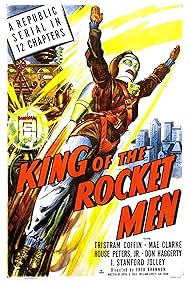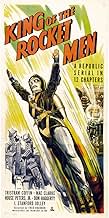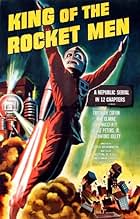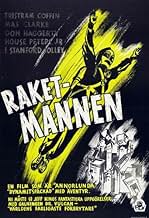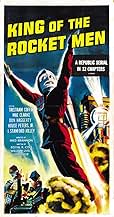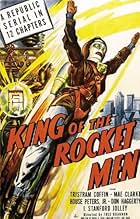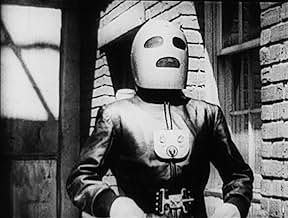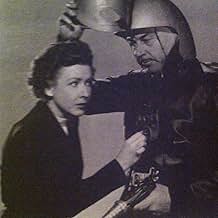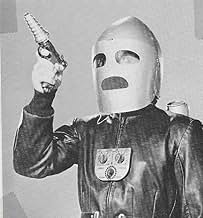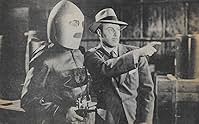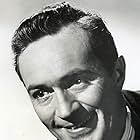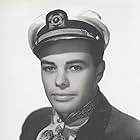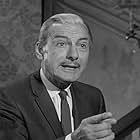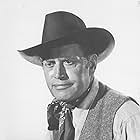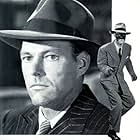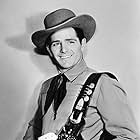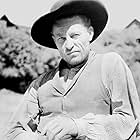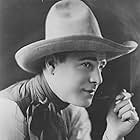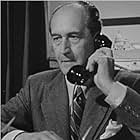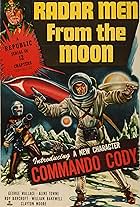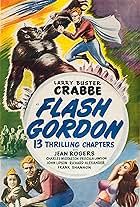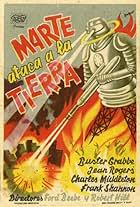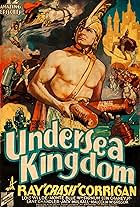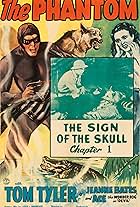PUNTUACIÓN EN IMDb
6,8/10
1 mil
TU PUNTUACIÓN
Jeff King, con su traje cohete experimental, lucha contra el malvado Dr. Vulcan.Jeff King, con su traje cohete experimental, lucha contra el malvado Dr. Vulcan.Jeff King, con su traje cohete experimental, lucha contra el malvado Dr. Vulcan.
- Dirección
- Guión
- Reparto principal
Marshall Bradford
- Prof. Graftner
- (sin acreditar)
Arvon Dale
- Chairman's Aide [Ch. 12]
- (sin acreditar)
Reseñas destacadas
Dr. Vulcan, a mysterious criminal, has been sabotaging the experiments of a group of scientists at Science Associates (SA), as well as murdering the ones who come close to discovering his identity. He murders Prof. Millard, a rocket expert, who has been suspecting the nature of Vulcan's attacks. Millard is saved from his death by his colleague, Jeff King, a sonic propulsion expert. In order to save the works and surviving members of SA (where Vulcan in his true identity, serves as a member of the board of directors), King assumes the identity of Rocket Man, using a jet rocket pack designed by Millard. For 12 chapters, King/Rocket Man battles the forces of Vulcan and tries to prevents Millard's latest invention, the Sonic Desemator, from falling into the hands of Vulcan. For 1948, KOTR comes off as a good serial, but really you think it could have a been a wee bit better coming out of Republic. Coffin turns in a decent performance as King, after playing mainly villains all his career. Haggerty is great though as Vulcan's henchman Dirken, and makes you wish Republic used him more as a villain in more serials and Bs. Brannon is no Witney, English, or Bennett when it comes to serial directing, but this is one of his better serials. Many errors of logic in the serial, but does it matter in a serial about a scientist fighting crime in a rocket suit? Rating, based on serials, 6.
1949's "King of the Rocket Men" was the first of three serials from Republic Pictures featuring a man wearing essentially the same rocket suit and helmet. The other two, both released in 1952, were "Radar Men From the Moon" and "Zombies of the Stratosphere." All three have things going for them though, each time, Republic tried to reinvent the character ... Jeff King in "King," Commando Cody in "Radar," and Larry Martin in "Zombies." The first and second serials were later revised for different purposes. "King of the Rocket Men" was edited to remove the cliffhanger sequences and the "remember when" episode (the one which is primarily flashbacks of prior chapters) and re-released it as a feature film titled "Lost Planet Airmen" in 1951. And "Radar Men From the Moon" was released as a 12-episode TV series under the new title, "Commando Cody: Sky Marshall of the Universe" in 1953. The third serial, "Zombies," while not remade, is probably the best remembered since it marked the science-fiction feature film acting debut of Leonard Nimoy (later, Mr. Spock of Star Trek fame) playing Narab, a Martian zombie.
But, "King of the Rocket Men" was the best of the three. Especially during 1949 and subsequent years, it was far more believable to envision a potential traitor, blackmailing government entities and possibly selling secrets to a foreign power than to believe in invaders from the Moon or Mars (in "Radar" and "Zombies," respectively). Also, and this is just my opinion, the two later serials seemed a bit contrived ... like they were merely attempting to cash in on the success of "King" ... a very well-acted serial for the time with an iron-clad plot line.
So, why the 8 of 10 rating? Back in 1949, money was tight in the studios. And sometimes, it was cheaper to "buy" special effects than it was to make them. That's exactly what Republic Pictures did. Since they wanted cataclysmic special effects in the last chapter but didn't want to spend the money, they simply bought rights to the 1933 film, "Deluge," for the sole purpose of borrowing the special effects footage for use in "King." And while there's nothing inherently wrong in such a practice (it has been done many times by Hollywood), it almost forced "Deluge" into obscurity. There were very few copies of "Deluge" available and, after Republic borrowed the scenes, they trashed the rest of the footage. Fortunately, one copy (not the Italian one with English subtitles) was discovered in France and it has since been preserved (though not openly released by any studio). In English? Don't know.
But, "King of the Rocket Men" was the best of the three. Especially during 1949 and subsequent years, it was far more believable to envision a potential traitor, blackmailing government entities and possibly selling secrets to a foreign power than to believe in invaders from the Moon or Mars (in "Radar" and "Zombies," respectively). Also, and this is just my opinion, the two later serials seemed a bit contrived ... like they were merely attempting to cash in on the success of "King" ... a very well-acted serial for the time with an iron-clad plot line.
So, why the 8 of 10 rating? Back in 1949, money was tight in the studios. And sometimes, it was cheaper to "buy" special effects than it was to make them. That's exactly what Republic Pictures did. Since they wanted cataclysmic special effects in the last chapter but didn't want to spend the money, they simply bought rights to the 1933 film, "Deluge," for the sole purpose of borrowing the special effects footage for use in "King." And while there's nothing inherently wrong in such a practice (it has been done many times by Hollywood), it almost forced "Deluge" into obscurity. There were very few copies of "Deluge" available and, after Republic borrowed the scenes, they trashed the rest of the footage. Fortunately, one copy (not the Italian one with English subtitles) was discovered in France and it has since been preserved (though not openly released by any studio). In English? Don't know.
This has some of the most convincing flying sequences for its time. The later Superman serial had him "fly" as a cartoon: here, King appears really to fly. I have read that the flying sequences used a lightweight dummy on wires. It looks pretty convincing.
Minor spoiler: There was only one "rocket man": the serial title suggests more. (The hero's name is Jeff King) For that matter, the flight controller is marked, "Slow," "Fast," "Up," and "Down." Not bad, but rough if one had to change direction in flight.
Naturally, the serial uses the standard formula of a colorful villain who's out to steal a secret, whom the hero has to contend with.
Worth viewing, but light entertainment.
Minor spoiler: There was only one "rocket man": the serial title suggests more. (The hero's name is Jeff King) For that matter, the flight controller is marked, "Slow," "Fast," "Up," and "Down." Not bad, but rough if one had to change direction in flight.
Naturally, the serial uses the standard formula of a colorful villain who's out to steal a secret, whom the hero has to contend with.
Worth viewing, but light entertainment.
It's one of Republic's last great serials, the inspiration for Disney's "The Rocketeer," and just great fun. Really standout special effects, the patented Republic furniture-smashing, body-slamming fights, a goofy plot, and just as much action and movement as you can stand. Any kid that didn't wish to be a "rocket man" sometime in their childhood had no red blood in them. Highly recommended. Star Tris Coffin should be rediscovered.
This was a fantastic serial with great special effects for it's time. Unfortunately, many who review such fare today do so from feature length versions. One must always remember that these serials were meant to be viewed, chapter by chapter, on a weekly basis. It was the draw that got you back to the theater and a five cent bag of fresh popcorn with real butter, not butter substitute. This cherished specialized cinema of the 1940's and early 50's, produced mainly for kids, was known widely as "Saturday Mornings At the Movies".
To understand and appreciate such cinema, one really needs to have the inventive mind of a child, growing up during such exciting times of pioneering new technology. There was no 24 hour television in color or black and white, VCR's, or anything to get in the way of a child's greatest attribute, their imagination. This was the generation that would grow up to make all of these modern day wonders come true.
It is also fair to mention that stars like Tristram Coffin, deserved to be remembered for the fine actors they were; despite the limited range of the roles they played. After all, it takes a fine actor to make even a child believe that a man can strap two powerful flaming rockets to his back, attached to a flimsy leather jacket with four simple control knobs in front, and fly convincingly - without being killed. How many of our high paid, so-called actors of today can effectively accomplish such a feat?
To understand and appreciate such cinema, one really needs to have the inventive mind of a child, growing up during such exciting times of pioneering new technology. There was no 24 hour television in color or black and white, VCR's, or anything to get in the way of a child's greatest attribute, their imagination. This was the generation that would grow up to make all of these modern day wonders come true.
It is also fair to mention that stars like Tristram Coffin, deserved to be remembered for the fine actors they were; despite the limited range of the roles they played. After all, it takes a fine actor to make even a child believe that a man can strap two powerful flaming rockets to his back, attached to a flimsy leather jacket with four simple control knobs in front, and fly convincingly - without being killed. How many of our high paid, so-called actors of today can effectively accomplish such a feat?
¿Sabías que...?
- CuriosidadesThis was another of Republic's titles to use a play-on-words for "King of..." "King" was actually the name of the main character.
- PifiasAt the end of Chapter 6/ beginning of Chaper 7, when the truck smashes through the warehouse wall and goes over the cliff the rear wheels and axle become completely detached from the undercarriage, but when the truck plunges into the water the axles and wheels are attached to the truck.
- Citas
Glenda Thomas: Am I glad you caught up with me again.
Jeffrey King: It's getting to be a habit that I'd like to break.
Glenda Thomas: Well, I was only trying to help.
Jeffrey King: The best you can do is help yourself to a ride back to town. The highway is right over there.
- Versiones alternativasThis Republic serial was edited down to a feature film and released under the title "Lost Planet Airman."
- ConexionesEdited into Lost Planet Airmen (1951)
Selecciones populares
Inicia sesión para calificar y añadir a tu lista para recibir recomendaciones personalizadas
Detalles
- Fecha de lanzamiento
- País de origen
- Idioma
- Títulos en diferentes países
- Der König der Raketenmänner
- Localizaciones del rodaje
- Republic Studios, Hollywood, Los Ángeles, California, Estados Unidos(Science Associates headquarters, etc.)
- Empresa productora
- Ver más compañías en los créditos en IMDbPro
Taquilla
- Presupuesto
- 165.592 US$ (estimación)
- Duración2 horas 47 minutos
- Color
- Relación de aspecto
- 1.37 : 1
Contribuir a esta página
Sugerir un cambio o añadir el contenido que falta

Principal laguna de datos
By what name was King of the Rocket Men (1949) officially released in India in English?
Responde